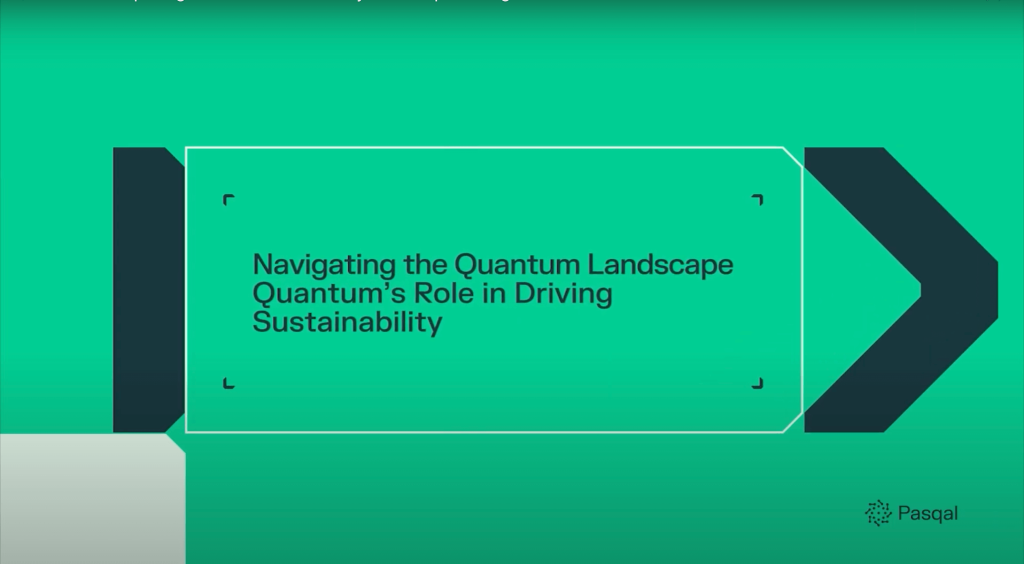
Sustainability
How quantum supports sustainability
With the limitations of processing capabilities of classical computers becoming evermore clear and foreseeable, quantum has the potential to accelerate the transition to a sustainable and resilient future.
Sustainability is a vital global priority. The United Nations’ Sustainable Development Goals (SDGs) aim to tackle complex issues like climate change, poverty, and inequality. These goals outline a path toward a more just and sustainable future. Achieving the SDGs, however, requires innovative solutions and advanced technologies. Enter quantum computers—revolutionary devices that utilize quantum mechanics to solve intricate problems with unmatched speed and scale. These machines offer new opportunities to optimize energy systems, develop sustainable materials, accelerate drug or vaccine discovery for more accessible healthcare and model environmental impacts with innovative performance.
The Open Quantum Institutes (OQI), incubated by the Geneva Science and Diplomacy Anticipator (GESDA), aims to bridge the gap between quantum science advancements and societal needs. OQI promotes international collaboration among academia, industry, and government to accelerate the development and deployment of quantum technologies. It focuses on creating an open and inclusive ecosystem to tackle global challenges, fostering ethical and sustainable quantum innovations for the benefit of humanity.
GESDA has stated that OQI’s goal is “to make high-performance quantum computers available to all those interested in finding solutions to accelerate the implementation of the UN’s sustainable development goals (SDGs) in health, energy, climate protection, and other relevant domains.”
Pasqal actively supports GESDA in the Open Quantum Institute activites. Pasqal’s technology, with its analog neutral atom devices, will enable the implementation of SDG use cases and play acritical role in the success of the OQI.
65%
of companies rank Climate and Sustainability as a Top-Three Priority
Source: https://www.bcg.com/publications/2022/innovation-in-climate-and-sustainability-will-lead-to-green-growth
83%
of companies rank Innovation as a Top-Three Priority
Source: https://www.bcg.com/publications/2024/innovation-systems-need-a-reboot
68%
of all start-up investments in quantum technology since 2001 have streamed into the industry over the past two years, an indication of investor confidence in the technologies’ future commercial potential.
Source:
https://www.mckinsey.com/capabilities/mckinsey-digital/our-insights/quantum-technology-sees-record-investments-progress-on-talent-gap
Scientists have been leveraging the most powerful supercomputers to store and analyze weather and climate data, simulate patterns, and model the future impacts of climate change. Ironically, these data centers consume an enormous amount of energy.
Since the last century, high-performance computers have advanced, providing more precise and faster calculations. Today, they host thousands of processor cores and require entire buildings with expensive cooling systems. Consequently, reducing energy consumption and greenhouse gas emissions has become a critical mission for companies offering computational and data storage services. Despite efforts to cut energy use, consumption remains extremely high.
Quantum computing is rapidly emerging as the next generation of high-performance computing to address complex problems that classical devices cannot solve efficiently. Many scientific and industrial computations scale exponentially in time on classical machines. The question is, will quantum advantage come with an energy consumption advantage?

Sustainability Whitepaper
Pasqal and Blaise Pascal Advisors, along with a consortium of partners including Genci/HQI, QEI, EDF R&D, are partnering to present this first assessment meant to promote meaningful and sustainable uses of quantum computing.
The analysis relies on clear criteria, accountable figures of life-cycle analyses of a Quantum Processing Unit (QPU), and a sound comparative basis to classical computing.
Quantum computing is already being applied to sustainable use cases today. From optimising energy grids and advancing materials science to accelerating drug discovery, quantum technology is paving the way for innovative solutions aligning with global sustainability challenges.
These insights enable real-time, accurate data collection, which is essential for effective environmental management and conservation. Quantum technologies enhance our ability to monitor and protect ecosystems, contributing to long-term sustainability goals.
These insights enable real-time, accurate data collection, which is essential for effective environmental management and conservation. Quantum technologies enhance our ability to monitor and protect ecosystems, contributing to long-term sustainability goals.
Video – Quantum for Sustainability
Quantum Computing : a sustainable catalyst
This session explores the intersection of quantum computing and sustainability, highlighting how quantum technologies can drive eco-friendly innovations and solutions. The esteemed panelists share their insights on leveraging quantum computing to address environmental challenges and promote sustainable practices across industries.

Because there is not yet a quantum technology standard, different kinds of architectures are competing in the market. The table below compares energy usage, including the most popular types of quantum computers. From there, you can see that Pasqal’s neutral (or cold) atoms machine is one of the most convenient for energy consumption in total and per qubit.
The energy cost of quantum computing varies depending on the components each machine requires and, for most of them, the number of qubits. Typically, the most significant costs are linked to the cryogenic system, which is essential for superconducting qubits but much less so for cold neutral atoms.
Pasqal’s current quantum processor, which has demonstrated the ability to operate with hundreds of qubits, consumes around 2.6 kW of power. Half of this consumption comes from lasers, with the remainder split between electronics and environment control.
It is important to note that these projections are rough estimates and will become clearer when these devices are in operation. Additionally, the hybrid (classical and quantum) workflow needed by most algorithms must also be considered.
The long-term energy usage of quantum technologies remains uncertain, but some estimates have been modeled considering scalability and error correction techniques. These techniques will require large numbers of qubits to enable calculations with low error rates in a reasonable timeframe.
Several questions remain unanswered, such as whether the potential energy advantage of quantum computing will apply to all types of algorithms and applications. Additionally, it is important to consider the greenhouse gas footprint associated with the fabrication of both classical supercomputers and quantum computers. Further economic and societal issues also arise, such as the implications of widespread quantum computing and potential regulatory measures.
Scientists and engineers rely on supercomputers for calculations and simulations to advance knowledge, create better products, and address critical challenges like climate change. To effectively combat climate change, companies offering computing services, whether classical or quantum, must continue researching ways to reduce their energy footprint. Meanwhile, humanity must persist in its efforts to achieve global sustainable development goals.